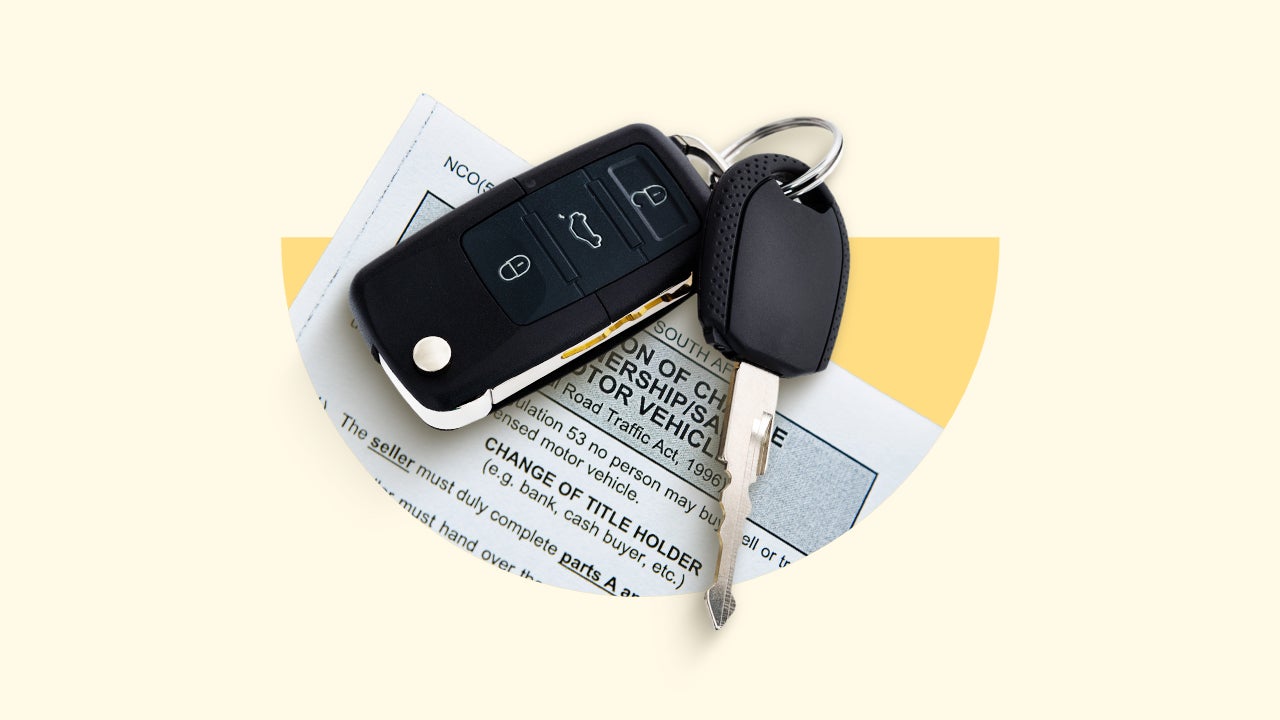Images by GettyImages; Illustration by Bankrate
Key takeaways
- Most states allow electronic processing to simplify and shorten the time it takes to transfer a title.
- Eight states let you hold your own title — making it easier to transfer it out of the lienholder’s name.
- It can take up to six weeks or more to have the lien removed from your car title and make it officially yours.
An auto lien is a note showing that your vehicle is legally owned by another party — in many cases, your lender. When you take out an auto loan, your lender will be listed as a lienholder on the title and have legal claim to the vehicle until you pay off your loan.
The title will be released to you after your loan is paid in full. At this point, the legal ownership of the car is transferred from your lender to you. In some states, getting your title is an automatic process after you pay off your loan. In others, you may have to submit paperwork to the Department of Motor Vehicles. Either way, expect to wait a few weeks for your title to be put in your name.
How do you get your title after paying off your car?
“After you’ve paid off your auto loan, you’ll have a ‘free and clear’ vehicle title, meaning you now fully own your car,” says Julie Shinn, vice president of lender management at RateGenius. “Any time there are ownership changes, you have to update the title.”
When you pay off your auto loan, you’ll need to notify the DMV, file for a lien release and transfer your title — though the specific steps will depend on where you live.
1. Notify the DMV
Once you pay off your auto loan, the lienholder must notify your state’s DMV or equivalent. The process depends on whether you live in a title-holding or non-title-holding state. Some states take care of it automatically, while others require you to do some grunt work.
2. File for a lien release
According to Shinn, your lender will send you a lien release in states that require you to file to get your title. It should take no more than 30 days, so get in touch with your lender or the DMV if it moves too slowly.
The lien release includes formal documentation that the loan is paid in full. Once you have it, your state may require you to submit physical paperwork — either by mail or in person. Depending on your state, your lender may use the electronic lien and title (ELT) system, which is a simplified process that takes significantly less time.
3. Transfer your title
In some cases, you can transfer your title electronically. The ELT system is generally quicker than if paperwork has to be submitted manually. If your state doesn’t use the ELT system, you or your lienholder may need to submit paperwork either by mail or in person.
Whichever your state uses, you will need to let your state know that you no longer carry a balance on your loan and are the sole owner of the vehicle.
Bankrate tip
To learn about the transfer process where you live, visit your state’s DMV website.
How long does it take to get a title after loan payoff?
Each state’s timeline for processing titles differs, and Shinn says that receiving your title can take anywhere from two to six weeks after submitting the paperwork. Generally speaking, your lender should be able to verify final payment and send the title within around 10 days, then the DMV will need time to fully process the change.
In states with DMVs that mail titles automatically, the time it takes is usually around 15 to 30 days. Be sure to follow up with a call, email or in-person visit if you’ve been waiting without any notifications for too long.
What happens when you pay off your car?
In addition to receiving your vehicle title, paying off your car loan can impact your finances in a few ways.
- Credit scores: You may see a temporary dip in your credit scores after paying off your car loan. However, your scores should recover over time if you practice good financial habits.
- Car insurance: Paying off your car loan doesn’t guarantee lower car insurance premiums, but it does give you the flexibility to drop comprehensive and collision coverage if you feel that it isn’t necessary.
- Other expenses: Not having car payments can free up cash for other financial goals like retirement or paying down other debts. Reassess your budget and determine where your money is best saved, spent or invested.
Bottom line
You may need to file some paperwork when you finish paying off your car loan. But in some states, it may be as easy as waiting for the lender to submit electronic verification.
Either way, you should be proud that you paid off your auto loan. Consider your future finances before upgrading to a different car with a new auto loan rate, especially if your car is still in good condition.
Why we ask for feedback
Your feedback helps us improve our content and services. It takes less than a minute to
complete.
Your responses are anonymous and will only be used for improving our website.
Help us improve our content
Read the full article here
















